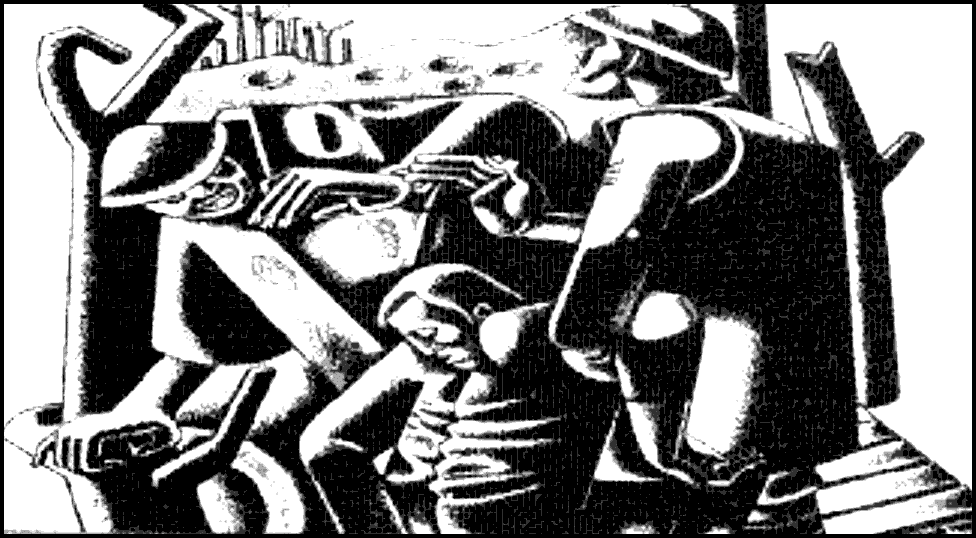
Casualty
Figures
How Five Men Survived
The First World War
Michèle Barrett
(Verso)

Exile Editions recently published a little-known title by a Canadian survivor of World War One, The German Prisoner. It is no exposition of heroism and valor under fire. Rather, it's an unsettling story about an Irishman and Englishman on the front lines at Boves who find themselves trapped in a bomb crater with a young German soldier. He tries to surrender, but O'Garra and Elston beat him to death and then violate his body in various unspeakable ways. Obviously, trench warfare has turned them mad.The German Prisoner was not published during the lifetime of its author James Hanley because his two soldiers were shown to be so grisly. But their barbarity was not special, nor peculiar to them. In Casualty Figures, Barrett cites a study by Norman Fenton that found that, seven years after the termination of the war, soldiers who had been diagnosed as shell-shocked, "less than 40% were regarded as functioning normally, and nearly 20% were found to be a burden to society." This at a time when the diagnosis "shell-shocked" was tantamount to cowardice. The symptoms included "depression, exhaustion, bitterness and alcoholism ... and failings as parents and partners." (The figures are, interestingly, almost the same for those who are serving in or who have served in the present conflict in Iraq.)
Casualty Figures is a study of three WWI soldiers and two military doctors. The story of their war service and the aftermath are drawn from diaries, clippings, letters and interviews with families and friends.
This war lasted for slightly more than four years, and it was a doozer. Barrett tells us that from the late summer of 1914 until the eleventh hour of the eleventh day of the eleventh month of 1918, "an average of 5,600 soldiers died every day." The bones of an estimated 200,000 combatants were never identified. Austria lost almost 90% of her men mobilized, and some economists think that the 1929 - 1933 depression was directly caused by a lack of manpower (and consumers) of those between the ages of 30 and 60.
The total number of casualties --- civilian and military --- is estimated to range from twenty to forty million. An English revue of the times gave us a song, "Oh, What a Lovely War." Such, one could guess, is all a matter of taste. And, perhaps, irony.
The letters and diaries of the soldiers themselves tell of a crowding of trenches and roads; an abundance of mud and rain (and mud and rain); the massive destruction of towns, farms, and countryside at the front; the incessant noise of it all; the total obliteration of bodies from falling shells; the terror of being gassed; the forlorn cries of the dying in "No-Man's Land" mixed, at times, with the merry song of birds; the unholy smell of death that permeated the lines and lived on in the soldiers' very nostrils for months after the fact.
Of the five stories told here, the memories of the professionals are the coolest and perhaps the least memorable. This a medic, Captain Lawrence Gameson:
There is a continuous stream of wounded though at all hours. The pips on my tunic cuffs are shiny with polished blood of someone else, of infantry mostly. Although but a middleman, one gets sick of blood's smell and of the endless everlasting procession of red raw human meat passing through our hands.
The most fascinating appears in the diaries and letters of Ronald Skirth. Like all the others in this book, he went through breakdown. In contrast to O'Garra and Elston, Skirth was torn by his encounter with the body of "Hans" immediately after the Battle of Messines Ridge. "His posture was perfectly natural and normal," he wrote.
He was a boy who, but for the colour of his hair and uniform, must have looked very like me. I was nineteen, he was younger still.
The boy had died looking at the snapshots in his wallet ... one of his parents, another of a young girl "who could have been taken for Ella's twin sister." Ella was Skirth's girlfriend, later to be his wife.
After his mental collapse, Skirth vowed never to kill again, and although he returned to the front --- for a time in Italy --- he quietly sabotaged the war effort. His job was to guide the artillery aimed at the enemy, but he had made "a pact with God" never to kill again:
The nearest enemy hutments were a hundred yards away and I should arrange for my preliminary mis-calculations to ensure that the first shells we fired gave the Aussies [the Austrians] adequate warning. Every time I took part in an 'action' from then on till the war ended, I did the same, so that we never once hit an inhabited target...
It was intentional sabotage. It never hurt anyone. And it gave Skirth the peace he needed to continue with the war, although --- in the best Buddhist sense --- he "chose to do no harm."
--- Rachel Guess